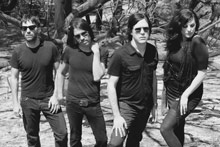When you first hear the name The Warlocks, it’s hard not to imagine a band of leather-jacket-wearing, Tolkien-quoting metal heads with jet-black hair and a definite urge to crank up the amp until the lights dim. But, were you to listen to a few snippets of their album without hearing their name, chances are you’d be struck by visions of bead-wearing hippies, sonically exploring the space between a slightly sinister hallucination and a forgotten era in krautrock.

So, which are they? Luckily, the Los Angeles-based Warlocks and their music stand firmly on the common ground between these two very different genre-bending descriptions.
Their musical flag is planted firmly at the turbulent intersection of gloomy, introspective metal and the peace-and-love eschewing aesthetic of modern-day psychedelic rock. The standard bearer for this sound, the man at the eye of the sonic hurricane of ideas, is lead singer/guitarist and band leader Bobby Hecksher.
It’s not too much to call Hecksher a wunderkind, almost a contemporary Phil Spector of underground music, who paints his wall of sound with a dreamy mural that’s part landscape and part acid trip.
Hecksher says that psychedelic music “feels more alive, more full, more free-form and richer. Some of the best bands are really stream-of-consciousness and that really attracts me to their music.”
That attraction and subsequent exploration of the sound helped the Warlocks find a following, largely on the West Coast, that hungers for a heavy barrage of sound in spacey, occasionally droney format. Their latest album, Heavy Deavy Skull Lover (Tee Pee, 2007) is a good example of this, even provoking a largely good review by Pitchfork Media that summed the album up as “The Cure: Live at Pompeii.”
And Hecksher doesn’t seem to mind that his music has been lumped in as an art-rock experiment.
“Artistically, that’s how I see albums—as art pieces,” he says. “Not as songs or genres or anything else, just pieces heavily influenced by psychedelic music.”
But just because the band forsakes the more stereotypical ideas that come with psychedelic rock—the light jammy sound and clean, glistening guitars, in particular—for a more metal-tinged sound, this doesn’t mean that they are ready to surrender their Haight-Ashbury influences to the Walls or Mordor.
“I look at it more as a phase,” Hecksher says.” Heavy Deavy Skull Lover is kind of like a distorted art piece. But I’m not going to make any more records like that probably, but I felt that at the time that the material that I was working on was really disjointed and fractured, and that it was something that we as an experimental rock group should do.”
But it psychedelic sounds don’t define the Warlocks as a band, what about the darkness in their sound? It is part of their overall musical mission to keep a gloomy undercurrent in their songs?
“Yeah, [our music] is dark,” he says, adding that all of the Warlocks music—not just their current foray into the dark and trippy—shares common threads. “This album, like all of the material I work on, is connected.”
And that connection is a powerful one. It can take standard a rock idea and turn it into a twisting, bending experience that never seems to break. In the right context, it could blow your mind; in another, it could melt your face. And, when the Warlocks do it, at least, that’s not a bad thing.
[Jason Bugg is a freelance writer based in Asheville.]
who: The Warlocks with The Black Angels
what: Drone-like psychedelia
where: Grey Eagle
when: Friday, July 4 (9 p.m. $12. www.thegreyeagle.com or 232-5800)



A little trivia that adds to the mix…The Grateful Dead were first known as The Warlocks but someone else was already playing under that name….I’m intrigued, but being out for a show on the 4th is a lot like new year’s eve….amateur night…think i’ll stay out in the woods where if I get drunk and hit a tree I’ll only being going 2 mph….